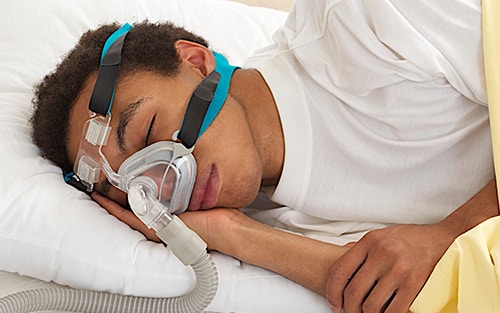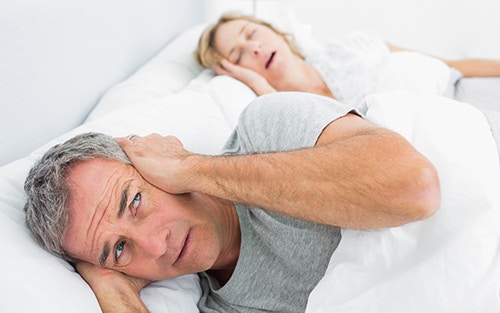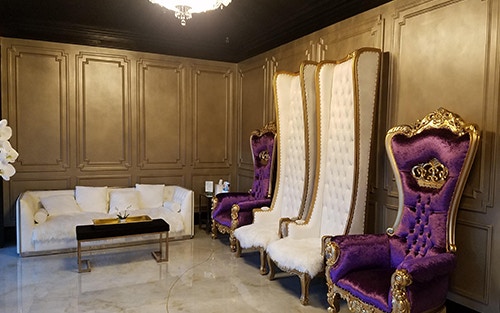Prevent sleep apnea from making you toss and turn all night long – robbing you of restorative rest and sleep. Knowing how to identify an issue with sleep apnea will help you seek out the correct treatment.

yourfootpalace.com gathered information about the definition, multiple symptoms, and treatments for sleep apnea.
What is Sleep Apnea?
Sleep apnea is defined as a sleeping disorder potentially leading to severe health problems, like high blood pressure and heart issues. Untreated sleep apnea causes one’s breathing to stop repeatedly during sleep, causing snoring and daytime sleepiness, even after a whole night’s sleep. Sleep apnea may affect anyone, but it occurs most often with older, overweight men.
Types of sleep apnea include:
Obstructive Sleep Apnea (OSA) – This is the more common form, occurring when throat muscles relax. This type of sleep apnea is classified as follows:
- Mild obstructive sleep apnea means that your AHI (apnea-hypopnea index) is between 5 and 15
- Moderate obstructive sleep apnea means that your AHI is between 15 and 30
- Severe obstructive sleep apnea means that your AHI is greater than 30 (more than 30 episodes per hour)
Central Sleep Apnea – This form of sleep apnea occurs when your brain isn’t sending proper signals to the muscles that control your breathing.
Complex Sleep Apnea Syndrome – Finally, this form of sleep apnea occurs when someone has both obstructive sleep apnea and central sleep apnea.
Note: Sleep apnea occurs in about 3 percent of normal-weight individuals but affects over 20 percent of overweight or obese people. Typically, sleep apnea affects more men than women. Sleep apnea is frequently linked to heart disease and metabolic issues like diabetes.
Sleep Apnea Symptoms
Frequently, the initial signs of OSA are not detected by the patient but by their bed partner. Many of those affected by OSH have no sleep complaints. Common signs and symptoms of OSA include:

- Snoring.
- Daytime sleepiness or fatigue.
- Cognitive impairment, such as trouble concentrating, forgetfulness, or irritability.
- Mood disturbances (depression or anxiety).
- Night sweats.
- Frequent nighttime urination.
- Sexual dysfunction.
- Headaches.
- Restlessness during sleep, frequent nighttime awakenings.
- Sudden awakenings with a sensation of gasping or choking.
- Dry mouth or sore throat upon awakening.
- People with central sleep apnea often report recurrent awakenings or insomnia; they may also experience a choking or gasping sensation upon awakening.
Sleep Apnea Treatment
It is widely understood that regular exercise and a heart-healthy diet are the most essential activities for your cardiovascular health. However, it has become increasingly evident that your sleep quality is also critical to your heart’s wellbeing.
Positive Airway Pressure Devices – Positive airway pressure machines, known as CPAP (Continuous Positive Airway Pressure) machines, are the most commonly used treatment method for moderate and severe sleep apnea.
Note: The mask, when worn properly during sleep, supplies pressurized air, flowing continuously or intermittently to the sleeper’s esophagus. The increased air pressure prevents the sleeper’s airway from collapsing.
PAP machines eliminate snoring in addition to treating obstructive sleep apnea.
Oral Appliances – Oral appliances for sleep apnea treatment continue to increase in popularity. These appliances are worn in the mouth, similar to a sports mouthguard or an orthodontic appliance, while you sleep. Such oral appliances hold the lower jaw slightly forward, so the airway remains open and prevents the tongue and muscles in the upper airway from blocking the airway.
The American Academy of Sleep Medicine (AASM) recommends oral appliances for those with severe OSA who cannot tolerate or wear a CPAP device. Another option for people with severe OSA is combination therapy (wearing CPAP and an oral appliance together).
Advantages of Oral Appliance Therapy – Oral appliance therapy is an effective, non-invasive treatment that can conform to your lifestyle. Patients generally prefer oral appliance therapy because it is:
- Comfortable
- Quiet
- Portable
- Convenient for travel
- Easy to clean and care for
Weight Loss – Around 70 percent of people suffering from obstructive sleep apnea are overweight or obese. Health care professionals typically recommend for them to lose weight.
Note: In some situations, physicians may prescribe weight loss medications to overweight or obese patients with OSA.
Spa Day and Massage – Spa days or massages should already be a part of your weekly or monthly routines. They can provide you with the following benefits:

- Helps to De-Stress
- Releases Serotonin and Dopamine
- Helps With Anti-Aging
- Reduced Headaches
- Helps to Relieve Pain
- Helps to Smooth Skin
- Helps to Make Skin More Radiant
- Enhances Sleep
Note: In addition, Massages can help ease arthritis or muscle tension pain, stimulate blood flow, and boost circulation.
Disclaimer: If you experience any of the above symptoms or detect any irregularities in your sleeping habits or health, it is highly recommended that you immediately consult your primary care physician for evaluation, advice, and treatment.
Sleep Apnea
In this article, you discovered essential information about sleep apnea, its definition, symptoms, and treatment options.
Recognizing and seeking help for sleep apnea can help you live a healthier life with more restorative sleep and reduced risk of heart, lung, and other organ trouble.
Ignoring sleep apnea symptoms can lead to severe and debilitating conditions, including heart failure and even death.
Sources:
my.clevelandclinic.org/health/diseases/8718-sleep-apnea
sleepapnea.org/treat/sleep-apnea-treatment-options/
mayoclinic.org/diseases-conditions/sleep-apnea/symptoms-causes/syc-20377631
hopkinsmedicine.org/health/wellness-and-prevention/the-dangers-of-uncontrolled-sleep-apnea
aasm.org/oral-appliance-therapy-clinical-guideline-published-jointly-by-aasm-and-aadsm/
(706) 521-5290
(678) 963-5958